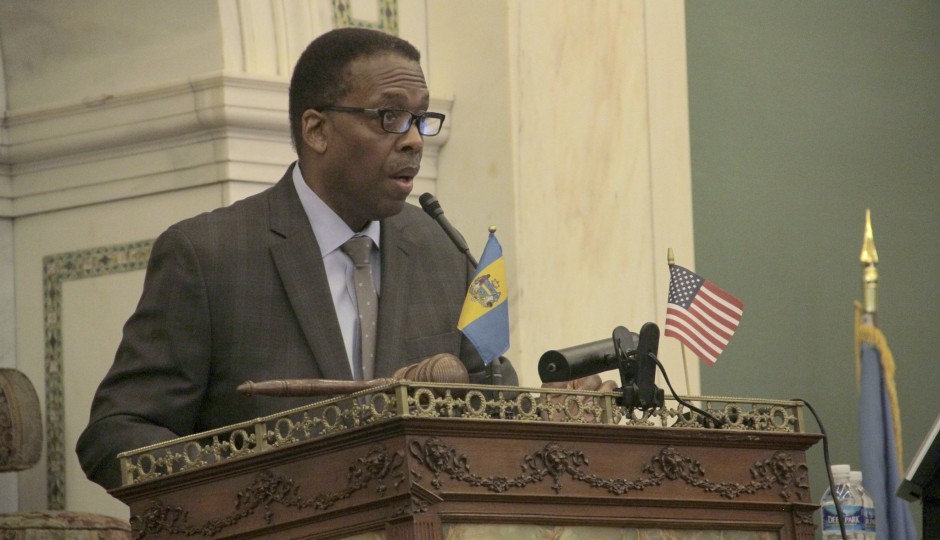The Brief: Mayor Darrell Clarke Launches Big, Bold Affordable Housing Plan

City Council President Darrell L. Clarke. | Copyright of the Philadelphia City Council. Produced and Edited by Michael Falconi
(Editor’s note: This story has been updated with additional information from Clarke spokeswoman Jane Roh.)
Mayor City Council President Darrell Clarke launches 2,000 unit affordable housing plan.
The gist: Last year, City Council announced an ambitious plan to build 2,000 units of affordable housing in (largely gentrifying) neighborhoods across the city. Yesterday, Council and Clarke celebrated the imminent ground breaking on 32 of those units in Francisville.
The plan is an interesting one. Unlike a lot of affordable housing, this initiative is targeted squarely at working class and middle class residents earning 80 percent to 120 percent of the area’s median income. As Newsworks reported:
Clarke is targeting residents wedged in an underserved income bracket.
“A husband who’s a nurse and makes a decent amount of money, and a wife who might be a manager of a Rite-Aid, maybe they make $65,000 together,” Clarke said.
“They can’t afford a market-rate house, but they also don’t qualify for public housing, as evidenced by the federal guidelines,” he said. “They need to be in a position where they can buy a product in the city of Philadelphia, and that’s the price-point that we want to address.”
Why it matters: The merits of the project are interesting to consider, but so are the politics.
First, the policy. One of the intriguing elements of the plan is that it’s intended to make use of the city’s large holdings of unused vacant land. Developers selected for the project will receive lots for a nominal fee. Clarke’s thinking there is twofold. 1) Giving the land away should make it more feasible for developers to build affordably and 2) It puts these properties back into productive use, and back on the tax rolls.
Last year, the building trades unions had agreed to assist this plan by doing this work at reduced rates — though none of the coverage of yesterday’s event discussed the union role here. Jane Roh, Clarke’s spokeswoman, said in an email that was because the city is still awaiting HUD approval on the project labor agreement.
That, combined with use of a little-used federal tax credit program, are needed for the affordable rental units (as opposed to privately owned homes) to become reasonably cost-effective for builders.
So there are certainly some innovative aspects to this approach, although the old debate over whether the city ought to be focused on funding housing projects, as opposed to embracing policy that could make privately-funded affordable housing more available, still applies.
The politics are intriguing as well. This initiative is the sort of thing one expects from a mayor, not a Council president. Now, Clarke couldn’t actually get this done on his own. He needed buy-in from the administration, which he got. The Philadelphia Redevelopment Authority is actually running the project, and the mayor controls the PRA. But there’s no question where this initiative originated.
And while Clarke decided that Council needed to play a bigger role in the city during his wars with Mayor Nutter, there is no sign he intends to retreat once a new mayor is sworn-in next year. Quite the contrary, in fact.
A look inside a city elementary school “running on fumes.”
The gist: The Inquirer’s Kristen Graham zooms in on Mitchell Elementary in Southwest Philadelphia, profiling life inside the resource-strapped school as City Hall debates how much money to send the district. It’s a depressing, familiar, laundry list of deprivation. Ancient books. A principal checking a student’s blood sugar because no nurse is on duty. Dirty classrooms with desks too small for the gangly older kids.
Why it matters: There’s a dangerous dynamic at work right now in the schools story. People are tired of it. They’re bored. More funding problems. Not enough nurses. Yawn. What’s next? Citified sees it when we write about schools: nobody clicks. People have all read the story before. And, true enough, the story is the same, year after year. But you know what else hasn’t changed? Conditions in city schools.
Are changes coming to Philadelphia’s heavily critiqued civil forfeiture program?
The gist: Julie Shaw reports for the Daily News that a settlement between the city and some of the defendants in a federal civil lawsuit over Philadelphia’s civil forfeiture program could be coming soon.
Reports Shaw:
Darpana Sheth, an attorney with the Arlington, Va.-based Institute for Justice and the lead attorney for the plaintiffs, said that a settlement of the first claim in the suit would mean that the D.A.’s office would “no longer kick people out of their homes without giving notice or a hearing unless there are exigent circumstances,” or a situation in which immediate action is needed.
Shaw also quotes Assistant District Attorney Bryan Hughes as saying:
Hughes said while he could not comment, “our position throughout this lawsuit is we dispute liability as to [those] two counts of the complaint . . . We still maintain that the district attorney is not liable. At the same time, we’re evaluating our forfeiture program. We’re addressing issues as we see them arise.”
Why it matters: The city’s asset forfeiture program has been the subject of national scrutiny, ever since reporter Isaiah Thompson began highlighting its many flaws. District Attorney Seth Williams, however, has consistently defended the practice. Is change finally coming?
Connect with Citified
- Send tips to citified@phillymag.com.
- Sign up for the weekly Citified newsletter and never miss our best work.
- Follow us on Twitter @CitifiedPHL.
- Follow our writers on Twitter: @pkerkstra, @hollyotterbein, @malcolmburnley.